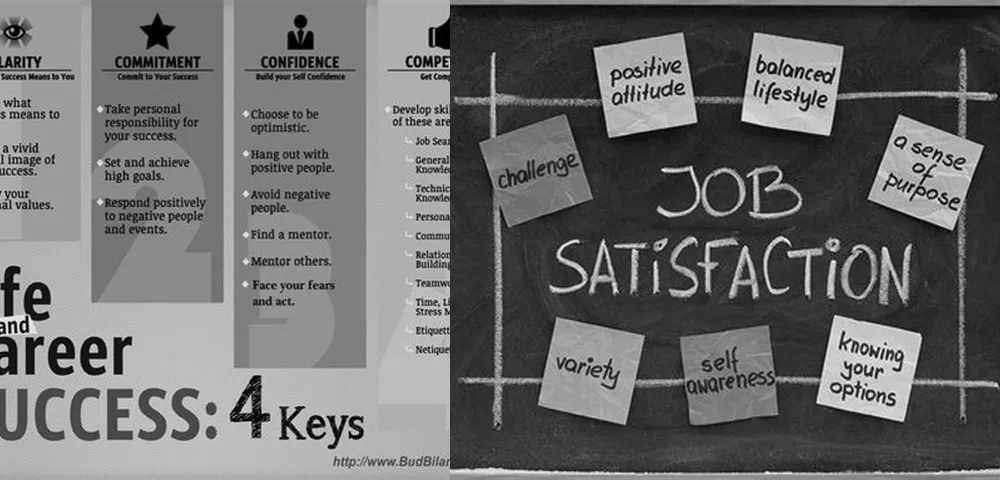Why is Personality Key to Job Satisfaction and Career Success?: Are you wondering why some people seem to thrive in their careers while others struggle to find job satisfaction and success? Well, it turns out that personality plays a crucial role in determining how fulfilled and accomplished we feel in our professional lives. From influencing our perception of compensation to shaping our career trajectory, personality traits can have a profound impact on our job performance and overall happiness at work. In this blog post, we will delve into the fascinating link between personality and job satisfaction, exploring how understanding and harnessing your unique personality can pave the way for a fulfilling and successful career. So, let’s dive in and uncover the secrets to unlocking your full professional potential!
Understanding the Link Between Personality and Job Satisfaction
It’s no secret that our personalities have a profound impact on our lives, shaping our relationships, hobbies, and yes, our careers. But what is it about personality that intertwines so closely with the satisfaction we derive from our jobs? Let’s delve into the facts.
The Role of Conscientiousness and Emotional Stability
Among the myriad of personality traits we possess, conscientiousness and emotional stability stand out as critical predictors of job satisfaction. Conscientious individuals, known for their reliability and attention to detail, often find themselves more satisfied because they can meet job demands effectively. Emotional stability allows individuals to remain calm under pressure and handle work stress without it spilling over into dissatisfaction.
Direct and Indirect Effects on Job Satisfaction
Personality impacts job satisfaction both directly and indirectly. Directly, it influences how we perceive our roles and responsibilities, while indirectly, it affects our interactions with colleagues and superiors, shaping our work environment and, in turn, our feelings about our jobs.
How Personality Influences Value Perception in Compensation
Ever wonder why some employees prioritize salary over other benefits while others value flexibility more? This is where personality plays a pivotal role in shaping what we value in terms of compensation. Those who prioritize achievement and recognition may value monetary compensation more, whereas individuals with a high need for work-life balance may place greater importance on flexible working conditions.
Personality and Self-Improvement
Strengths, Weaknesses, and the Road to Improvement
Recognizing our personality-driven strengths and weaknesses is crucial for personal development. By understanding our weaker areas, we can actively seek opportunities for improvement, whether through training, mentorship, or varied work experiences.
The Importance of Personality Fit
A successful career is not just about having the right skills; it’s also about fitting well within the job, team, and organizational culture. A poor personality fit can lead to conflict, dissatisfaction, and ultimately, a higher turnover rate.
Personality’s Impact on Career Trajectory
The Influence on Hiring and Promotion
From the moment you submit your resume to the day you’re up for promotion, your personality is under scrutiny. Employers use pre-hire personality assessments to predict job performance, and employees with desirable traits tend to have an edge in both hiring and promotional considerations.
Leadership Perception and Career Outcomes
How you are perceived as a leader or potential leader often hinges on your personality. Traits like openness, assertiveness, and empathy can significantly influence how others view your leadership capabilities, affecting your career advancement opportunities.
Personality Assessments and Job Performance Predictions
Pre-hire personality assessments have become a staple in the recruitment process. By gauging an applicant’s personality traits, employers can make informed predictions about future job performance and cultural fit, which is invaluable in making hiring decisions.
Competency and Personality: The Performance Connection
Employees aren’t just machines executing tasks – they’re complex individuals whose personalities profoundly affect their work performance. Those with a proactive, positive approach to their work are often more productive and contribute positively to team dynamics.
Personality’s Role in Job Satisfaction: A Minor Player?
Despite its significance, personality is only a piece of the job satisfaction puzzle. Other factors such as constructive feedback, a sense of autonomy, and the accumulation of experience often hold more weight. Still, neglecting the personality component would be an oversight for any organization aiming for a contented workforce.
Adaptability: The Bridge Between Personality and Success
While personality lays the foundation, adaptability is the secret weapon of successful professionals. It’s the ability to tweak your behavior and communication style to suit various circumstances, acting as a versatile toolkit for career advancement. In the ever-changing landscape of the modern workplace, adaptability is not just beneficial; it’s essential.
Personality and Job Performance Satisfaction
The connection between personality and job performance satisfaction is well-established in research. A positive attitude towards one’s job can indicate job satisfaction, while a negative attitude often points to dissatisfaction. It’s a dynamic interplay where personality shapes attitudes, which in turn, influence job satisfaction levels.
In conclusion, personality is a multifaceted contributor to job satisfaction and career success. It affects everything from our perception of job roles to the way we handle conflicts and pursue career advancement. While it may not be the sole determinant of job satisfaction, it’s a crucial element that, when combined with adaptability and other key factors, can pave the way to a fulfilling career journey.
FAQ & Common Questions about Personality, Job Satisfaction, and Career Success
Q: Is personality the key to success?
A: While personality provides a foundation, adaptability is crucial for growth and success. Successful professionals learn to adapt their behaviors and communication styles as needed.
Q: How does personality influence success?
A: Personality traits such as conscientiousness and emotional stability are important predictors of job satisfaction. However, personality is not the only factor that defines success. Skills, values, and interests also play a crucial role.
Q: What is the relationship between personality and job performance satisfaction?
A: Researchers have found that personality is related to job satisfaction and can predict employee behavior and performance. Positive attitudes towards one’s job indicate job satisfaction, while negative attitudes indicate job dissatisfaction.

